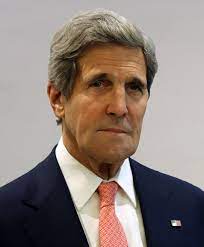Nigeria To Benefit From $12bn Climate Change Fund
US special envoy on climate change, Sen. John Kerry on Tuesday said Nigeria would benefit from the $12 billion Emergency Programme for Adaptation and Resilience Fund its government had put in place to tackle carbon emissions.
As a commitment to his pledge to tackle the global climate crisis, President Biden announced an ambitious set of targets to advance the President’s Emergency Plan for Adaptation and Resilience (PREPARE).
The program is expected to support developing countries and communities in vulnerable situations around the world in their efforts to adapt to and manage the impacts of climate change. The US government through its agency, USAID will contribute $21.8 million to disaster risk financing in Africa so that African countries can access and layer disaster risk financing, including insurance coverage, needed to successfully manage increasingly frequent and intense climate-related extreme weather events.
Sen. Kerry, who disclosed this to journalists after a meeting with the Minister of State for Petroleum Resources, Timipre Sylva, added that the US would be working with the Nigerian government in its deployment of gas as a transition fuel.
With the world gradually moving away from fossil fuel, Nigeria has put machinery in place to use its abundant gas resources as a transition fuel as it struggles to move away from ‘dirty fuel’.
“We agreed today in our discussions that we’re going to work very closely in our working group to be able to develop further the plan going forward concerning both the deployment of gas as a transitional effort, but also the important deployment of clean, renewable energy, and particularly solar and wind.
“In addition, we specifically agreed to a program of technical assistance which we will provide to further the hydrocarbon sector, methane abatement and decarbonization program, which we’re going to work on together. And this initiative is going to be supported by the Department of State, Energy and Mineral Governance program to align with Nigeria’s participation in the global methane pledge. So we look forward to some progress here and I hope we’re going to come up with some strong mutually agreed upon initiatives as we go to Sharm el Sheikh”.
As the world is planning to cut emissions by 45 percent by the year 2030, he acknowledged that 48 sub-Saharan African states are responsible for 0.55 percent of all emissions while 80 percent of all the emissions in the world come from 20 countries.
“So that is a reality with which we are all dealing and it has profound implications. At the same time, let me be clear, we’re all in this together. Nobody entered the Industrial Revolution suggesting that the outcome was going to be the climate crisis.”
Speaking earlier, Sylva noted that despite contributing less to global emissions, Sub-Saharan Africa continues to bear the brunt of climate change.
While noting that Nigeria is not a big carbon emitter, Sylva said the reality with Nigeria is faced with the obligation to provide energy and clean cooking fuel for its citizens.
“We are not denying that climate change is real. We accept the problem of climate change and we would also like to be in the energy transition train but we have certain realities that the world must take into account.
“Our reality is that we have a huge number of people without access to electricity and we don’t have the funding and the technology to be able to achieve this transition the way the rest of the global community would like us to do.
“And if we come together and collaborate we probably might be able to create that synergy and funding and the basis for us to move at the same pace”.
Ends



Comments are closed.